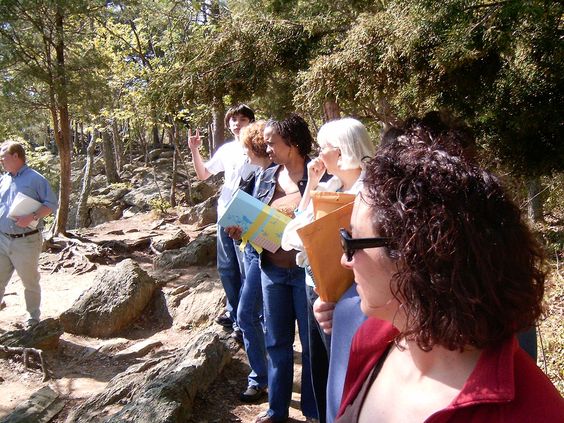As someone who organizes readings and a large literary arts
festival with workshops, author appearances, and exhibitors, over the last ten years I
have developed a list of writers who I will not work with again. And rest
assured, I’m not the only one who does this.
Why? Because they didn’t follow directions. It’s that
simple. Who's on it? Writers who acted like the organizer/staff were their personal assistant/manager.
Take note of the following ways to avoid this blacklist and
be a true professional!
KNOW YOUR OWN SCHEDULE
Double booking is such a big no-no we can’t believe you’re
not aware of this already yourself. Whatever you have to do to make sure you
know the days you are already booked: DO IT. Back out of our event at the last
minute because you “forgot” you already had a gig? You’re on the list.
SEND THE REQUIRED INFORMATION
It should be no surprise to you that we need your bio and
right away—possibly a short one and a long one. We also need a high resolution
digital photo of the appropriate size with good lighting, not a selfie taken in
the bathroom with your cell phone or with the light behind you. We need ordering
information for your book. Possibly your dietary restrictions or lunch/dinner
order. Special seating or parking needs. Have that at the ready to send right
away. Don’t have them? Get them together and email them to yourself now so you
will.
Have a publicity team? Great! They are usually more
organized than authors. But pick only ONE person for us to work with.
SEND THE REQUIRED INFORMATION AS REQUESTED
If we ask for your short bio, we mean about 100 words.
Not half a page, a full page, or two pages. Put your current, key publications, awards, job in there and include your website so people can find out more. You should not send a link to your
website or write back “it’s on my website which is in my signature block.” You will be asked again to send the bio and if you again don’t comply, you
won’t have a bio listed. Same with the
photo and book order info. If we give you the format in which we want these and
you send a link to your book on Amazon, Barnes & Noble, or your publisher’s
website you will be asked again, etc. If you're a "famous writer" we will chase you for the info but you'll go on the list.
MEET THE DEADLINE
When we tell you the deadline by which we need the
information we are not picking a random date. We have a deadline for ordering
your book and/or getting it to the host so he/she can read it before your
reading or interview. We are collecting information to layout and send to the
printer for marketing materials: brochures, programs, postcards. For posting on
the website and social media.
Decided at the last minute you want to change or send your picture now that it’s too late? Yeah,
no. Not changing the program which is already at the printer and would incur fees.
PUBLICIZE!
Organizers count on participants publicizing the event they
are part of, which helps extend the organization’s reach and hopefully means
high attendance on the day/evening. Post our event on your website, your
Facebook/Twitter/Tumblr/wherever pages. Follow our social media pages and share
info from them. Let people know about your part, but also share the info about
other writers, exhibitors, etc. if it’s a larger event or festival.
DON’T EMAIL WITH 101 QUESTIONS
We are aware of our own schedule. We know when we want to
release final details to authors, etc. Don't stalk us for weeks before asking where you’re parking, what
building/room you’re in, or asking if your book has arrived yet. We will send out the logistics email when everything is finalized and in plenty of time.
Please don’t “check in.” If we wanted to check in we would
have. Basic information is, by now, on the organization’s website: location,
day, time, parking. Do your own homework until you hear from us. That’s what
websites are for. If it’s a few days before and no email, check your spam
folder, then call.
How a reading works or an interview or a Q&A is not
rocket science. You shouldn’t need a minute by minute breakdown of what is
expected.
BE ON TIME—NOT EARLY AND NOT LATE
On the day of the event, don’t show up two hours before your reading if you’re part
of an event that runs for several hours, or a festival, wanting to check in or
with questions. Check in at the appointed time—an hour before is best. Wait
until the session before yours has started so it’s quieter and we can focus on
you.
Don’t wander off to other sessions, to lunch,
whatever, and not be there on time for the start of your event. Keep track of
the time and return at least fifteen minutes before your part starts.
CHECK IN
Always check in! Otherwise, you are considered a “no show”
and we are scrambling to figure out what to do without you, sending people to
look for you, spending time calling/texting you when there are ten other things
requiring our attention.
NO TEXTS/CALLS WITH QUESTIONS ON THE DAY
We simply do not have time to take your call. The ringer on
our cell is mostly likely turned off. If you want to reach us because you’re
going to be late due to traffic or a car breakdown, text us and give us your
name and ETA. If there is a host for your session, text them as well. Don’t
text us and ask us to tell them. We may not see them in time and guess what? We have ten other things requiring our attention. What? You don’t have their phone number? You
know my response to that.
DON’T GO ROGUE
If we didn’t offer or ask about your tech needs then please don't email asking if you can show a short film the day before the event. Or even weeks
before. Tech has already been decided. We’ve had the final walk-though. We would have to hire a tech person at the venue which
is not in our budget. You also may not call the venue yourself and ask for them
to do this for you. We have a contract with them and you are not part of it. Put whatever you want to show on your website and have
people view it on their smartphones during or after the session.
STICK TO YOUR TIME LIMITS
We probably gave you a time limit for your reading or, if
you’re a host of a reading/session at a festival for us, how long your session
is. If you’re a writer, choose appropriate material and practice reading it to
make sure you are just under your time. So if we said seven minutes that’s what
you prepare. Not three minutes. Not nine minutes. Your running under/over
screws up the schedule. Minutes add up.
If you’re a host, don’t run over. Manage/track your time. If
the host of the session before you didn’t do that and their session ran into
yours, let us know later (they will go on the list!), but that doesn’t mean you
can do the same to the session’s host and authors after you.
STAY THE WHOLE TIME – PARTICIPATE!
Go to other sessions if you’re at a festival. Stay the whole
evening if it’s a larger event/reading. Take pictures. Post on social media
using the event hashtag and quote writers/speakers. Tag people. Share other
people’s posts.
If you just do your part and leave you were not really a
participant making a contribution to our event and community.
IF SOMETHING GOES WRONG, BE GRACIOUS
Organizers are juggling more than you know depending on the
size of the event: partners and their expectations, venues, catering,
audio/visual recording, marketing, publicity, security, tech, tables, chairs, signage, exhibitors, book
orders, the schedule, volunteers, parking, transportation/hotel for visiting
writers, walk-throughs, last minute changes.
We are horrified that your name was spelled wrong or the
parking lot was closed or someone else took your vegan lunchbox. We didn’t do
it on purpose and we can’t fix it now. Don’t call/text us asking for restaurant
recommendations or the nearest parking lot. These are all accessible to you via
your own phone.
BOTTOM LINE
We are doing our best to make everyone comfortable and happy
while dealing with the banner falling off of the front of the building, microphones with dead
batteries, a famous writer needing directions over the phone instead of using
their GPS, volunteers who didn’t show up, the session room that’s locked so no
one can get in, obvious questions from people who could answer them by simply
opening and reading the program or checking the map.
There are plenty of people ready to criticize every aspect
of an event with massive amounts of know-it-all disdain. People who have never
organized anything in their life but who think they’d be geniuses at it. Don’t be that person. You have no idea what
was discussed, promised by venue/partners/caterers/etc., not allowed or
not available, or didn’t work on the day.
Be a help, not a hindrance. How? Remember that the event is
not about you (unless you’re the headliner, in which case, still be gracious,
not a diva). Do your homework. Do your prep. Bring your own water and a granola
bar, just in case. Leave early, map out additional parking, check in, tweet
about how much fun you’re having, smile.
We are excited to have you at our event! We think you’re
fantastic! But be responsible for yourself. If you can’t be, hire someone who
will be able to handle your needs/details or risk not being invited back and
word getting around that you are not a professional or too much work.
Your call.
Chris tweets
@EditorStewart and provides manuscript editing and critiques. Find tips, tools, information, and inspiration on her website:
The Real Writer.






 In
keeping with their spirit, and the spirit of the place, you can be as
goal-focused at the retreat, or as hesitant in approach as you wish. You
can talk novel, memoir, or short story publication with us, show us your manuscript,
improve your skills, clear your head, have your work read by our onsite
writer mentors, whatever you wish, whatever helps you grow and find your
vision as a writer. You tell us ahead of time via the
In
keeping with their spirit, and the spirit of the place, you can be as
goal-focused at the retreat, or as hesitant in approach as you wish. You
can talk novel, memoir, or short story publication with us, show us your manuscript,
improve your skills, clear your head, have your work read by our onsite
writer mentors, whatever you wish, whatever helps you grow and find your
vision as a writer. You tell us ahead of time via the 






